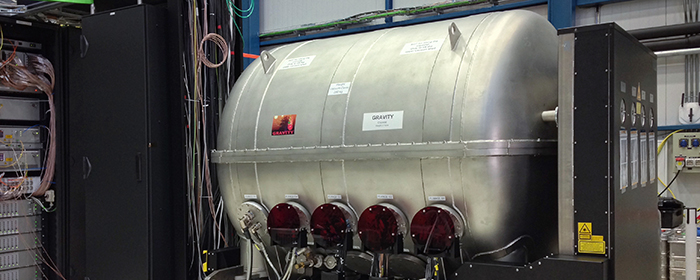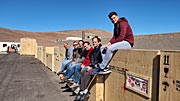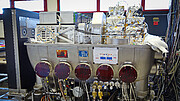Mitteilung
Leistungsstarkes Instrument zur Untersuchung Schwarzer Löcher am Paranal angekommen
Montage und Test von VLTI GRAVITY
11. August 2015
Das neue Instrument GRAVITY wurde nach Chile transportiert und erfolgreich im Paranal-Observatorium montiert und getestet.
GRAVITY ist ein Instrument der zweiten Generation für das VLT Interferometer (VLTI). Es ermöglicht die Vermessung von astronomischen Objekten auf kleinsten Größenskalen und interferometrische Bildgebung und Spektroskopie. GRAVITY wird dem VLT die höchstmögliche Sehkraft verleihen, wozu es die vier einzelnen Teleskope des Paranal-Observatoriums so kombiniert, dass sie wie ein einzelnes Teleskop mit einem Durchmesser von über 100 Metern zusammenarbeiten.
Dank verschiedener neuartiger Technologien wird GRAVITY die Empfindlichkeit und Genauigkeit gegenüber dem derzeitigen Stand deutlich verbessern [1]. Auf diese Weise ist eine Ortsbestimmung von Objekten in der Größenordnung von zehn Mikrobogensekunden und die Bildgebung mit einer Auflösung von vier Millibogensekunden möglich.
GRAVITY wird die hochauflösende Astronomie zu neuen Grenzen führen: Die Physik in der Nähe des Ereignishorizonts des supermassereichen Schwarzen Lochs im galaktischen Zentrum wird untersuchbar – eine Region, die von den Effekten dominiert wird, die von Einsteins Allgemeiner Relativitätstheorie vorhergesagt werden. Zusätzlich werden Details von Massenzuwachs und Jets enthüllt – Prozesse, die sowohl in jungen stellaren Objekten stattfinden, als auch in aktiven Kernen von anderen Galaxien. Außerdem können die Bewegungen von binären Sternen, Exoplaneten und jungen stellaren Scheiben untersucht und die Oberflächen von Sternen abgebildet werden.
Am 21. Juli 2015 hat das GRAVITY-Team mit einer Test-Lichtquelle "erste Labor-Interferenzmuster" in der Paranal-Integrationshalle gesehen. In den weiteren, folgenden Tests von GRAVITY und bei der Vorbereitung des VLT-Interferometers wird GRAVITY zum VLTI versetzt werden, um im weiteren Verlauf des Jahres ab November 2015 erste Stern-Interferenzmuster mit Hilfe der vier 1,8-Meter-Hilfsteleskope aufnehmen zu können. Die Inbetriebnahme von GRAVITY mit den vier 8-Meter Teleskopen soll in der ersten Hälfte von 2016 stattfinden.
Die Entwicklung von GRAVITY wurde vom Max-Planck-Institut für Extraterrestrische Physik in Garching geleitet, wobei sechs Institute aus ganz Europa [2] und die ESO beteiligt waren.
Endnoten
[1] GRAVITY ist mit faserbasierten integrierten optischen Strahlkombinierern, infraroten Wellenfrontsensoren für die Adaptive Optik, Interferenzmusterverfolgung, aktiver Strahlstabilisierung und einem neuen Metrologiekonzept ausgestattet.
[2] Die Partnerinstitute des GRAVITY-Konsortiums sind:
- Max-Planck-Institut für Extraterrestrische Physik, Garching
- LESIA, Observatoire de Paris, Université Paris Diderot, Meudon, Frankreich
- Max-Planck-Institut für Astronomie, Heidelberg
- Universität Köln, Köln
- Institut de Planétologie et d’Astrophysique de Grenoble (IPAG), Grenoble, Frankreich
- Laboratório de Sistemas, Instrumentação e Modelação em Ciências e Tecnologias do Ambiente e do Espaço (SIM), Lissabon und Porto, Portugal
- ESO, Garching
Links
Kontaktinformationen
Markus Schoeller
ESO, Garching
E-Mail: mschoell@eso.org
Frank Eisenhauer
Max-Planck-Institut für Extraterrestrische Physik, Garching
E-Mail: eisenhau@mpe.mpg.de
Richard Hook
ESO Public Information Officer
Garching
Tel: +49 89 3200 6655
Mobil: +49 151 1537 3591
E-Mail: rhook@eso.org
Über die Mitteilung
| ID: | ann15061 |
Our use of Cookies
We use cookies that are essential for accessing our websites and using our services. We also use cookies to analyse, measure and improve our websites’ performance, to enable content sharing via social media and to display media content hosted on third-party platforms.
ESO Cookies Policy
The European Organisation for Astronomical Research in the Southern Hemisphere (ESO) is the pre-eminent intergovernmental science and technology organisation in astronomy. It carries out an ambitious programme focused on the design, construction and operation of powerful ground-based observing facilities for astronomy.
This Cookies Policy is intended to provide clarity by outlining the cookies used on the ESO public websites, their functions, the options you have for controlling them, and the ways you can contact us for additional details.
What are cookies?
Cookies are small pieces of data stored on your device by websites you visit. They serve various purposes, such as remembering login credentials and preferences and enhance your browsing experience.
Categories of cookies we use
Essential cookies (always active): These cookies are strictly necessary for the proper functioning of our website. Without these cookies, the website cannot operate correctly, and certain services, such as logging in or accessing secure areas, may not be available; because they are essential for the website’s operation, they cannot be disabled.
Functional Cookies: These cookies enhance your browsing experience by enabling additional features and personalization, such as remembering your preferences and settings. While not strictly necessary for the website to function, they improve usability and convenience; these cookies are only placed if you provide your consent.
Analytics cookies: These cookies collect information about how visitors interact with our website, such as which pages are visited most often and how users navigate the site. This data helps us improve website performance, optimize content, and enhance the user experience; these cookies are only placed if you provide your consent. We use the following analytics cookies.
Matomo Cookies:
This website uses Matomo (formerly Piwik), an open source software which enables the statistical analysis of website visits. Matomo uses cookies (text files) which are saved on your computer and which allow us to analyze how you use our website. The website user information generated by the cookies will only be saved on the servers of our IT Department. We use this information to analyze www.eso.org visits and to prepare reports on website activities. These data will not be disclosed to third parties.
On behalf of ESO, Matomo will use this information for the purpose of evaluating your use of the website, compiling reports on website activity and providing other services relating to website activity and internet usage.
Matomo cookies settings:
Additional Third-party cookies on ESO websites: some of our pages display content from external providers, e.g. YouTube.
Such third-party services are outside of ESO control and may, at any time, change their terms of service, use of cookies, etc.
YouTube: Some videos on the ESO website are embedded from ESO’s official YouTube channel. We have enabled YouTube’s privacy-enhanced mode, meaning that no cookies are set unless the user actively clicks on the video to play it. Additionally, in this mode, YouTube does not store any personally identifiable cookie data for embedded video playbacks. For more details, please refer to YouTube’s embedding videos information page.
Cookies can also be classified based on the following elements.
Regarding the domain, there are:
- First-party cookies, set by the website you are currently visiting. They are stored by the same domain that you are browsing and are used to enhance your experience on that site;
- Third-party cookies, set by a domain other than the one you are currently visiting.
As for their duration, cookies can be:
- Browser-session cookies, which are deleted when the user closes the browser;
- Stored cookies, which stay on the user's device for a predetermined period of time.
How to manage cookies
Cookie settings: You can modify your cookie choices for the ESO webpages at any time by clicking on the link Cookie settings at the bottom of any page.
In your browser: If you wish to delete cookies or instruct your browser to delete or block cookies by default, please visit the help pages of your browser:
Please be aware that if you delete or decline cookies, certain functionalities of our website may be not be available and your browsing experience may be affected.
You can set most browsers to prevent any cookies being placed on your device, but you may then have to manually adjust some preferences every time you visit a site/page. And some services and functionalities may not work properly at all (e.g. profile logging-in, shop check out).
Updates to the ESO Cookies Policy
The ESO Cookies Policy may be subject to future updates, which will be made available on this page.
Additional information
For any queries related to cookies, please contact: pdprATesoDOTorg.
As ESO public webpages are managed by our Department of Communication, your questions will be dealt with the support of the said Department.




